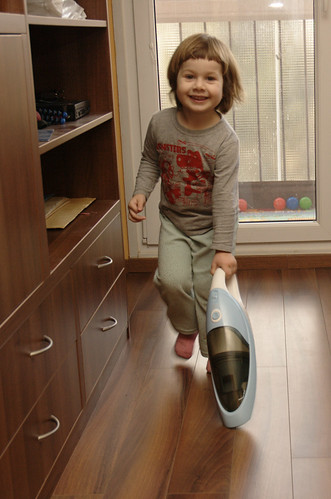Ways to Improve Indoor Air Quality for a New Baby
Most parents want their child to breathe clean indoor air, but few of them know what causes indoor air pollution or how to prevent it. Fortunately, with the right approach and a little know-how, you can improve the air quality inside your home. Here are five simple ways to improve the air your new baby breathes each and every day.
Keep It Clean

Image via Flickr by Honza Soukup
Regular cleaning is the most effective way to reduce allergens inside your house. When you clean your house, focus on the carpets, area rugs, drapes, bedding, and other items that usually attract allergens. Clean these items at least once or twice a week. You should also clear clutter, as it holds dust that can trigger an allergic reaction.
Only Use VOC-free or Odorless Paints
Before you paint your baby’s bedroom, make sure the paint you use doesn’t emit harmful odors or contain volatile organic compounds (VOCs)—compounds that easily become gases or vapors. Exposing your newborn to these odors or compounds can lead to acute respiratory problems or other serious medical conditions. It’s difficult to avoid VOCs all together, but purchasing high-quality products will usually be your best bet.
Invest In a Quality Air Purifier
Babies breathe in 50 percent more air per pound of body weight than adults do, so it’s important to keep the air as clean as possible. If you can’t control the source of allergens—for instance, you don’t want to give up your family pet—it may help to use an air purifier. Having an air purifier in your home, especially one equipped with a High-Efficiency Particulate Air (HEPA) filter and charcoal-based activated carbon filter will capture airborne chemicals and particles that can be easily inhaled by your baby. You may not be able to completely eliminate these allergens, but you can cut down on them.
Let the Fresh Air In
Proper ventilation plays a big role in Sudden Infant Death Syndrome (SIDS). According to a study published in the journal Archives of Pediatric & Adolescent Medicine, opening a window may have some effect in protecting children from SIDS, also known as crib death or cot death. Babies who slept in a room with the windows open were 36 percent less likely to die from SIDS compared to babies who slept in a room with windows closed.
Perform Regular HVAC Tune-up
Improper operation and maintenance of an HVAC system is one of the primary causes of poor indoor air quality, according to the Centers for Disease Control and Prevention. A dirty or poorly maintained HVAC system can spread dust and other allergens that affect your baby’s respiratory system. To keep your unit clean and in good condition and to maintain quality indoor air, it’s important to conduct regular tune-up. A reputable HVAC technician will be able to identify any issues, so you can plan ahead before unexpected repairs are needed.
Babies lungs are still developing, so it’s important to minimize air pollutants in your home. With clean indoor air, common respiratory problems can be prevented.
